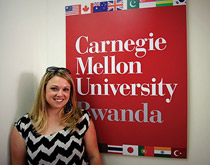 As a woman in tech, I’m devoted to learning from the inspiring role models in my field and sharing my experiences with the next generation of women leaders. When I had the opportunity to make these connections globally, I jumped at the chance.
As a woman in tech, I’m devoted to learning from the inspiring role models in my field and sharing my experiences with the next generation of women leaders. When I had the opportunity to make these connections globally, I jumped at the chance.
For two years, I’ve been a mentor for TechWomen, an exchange program through the U.S. State Department. Female technical leaders from the Middle East and Africa come to Silicon Valley for five weeks, where they are hosted at technology companies to complete projects and experience life here. This year, I mentored a budding entrepreneur from Jordan who was working on a pitch for her fashion startup. Last October, she worked alongside me at Twitter, where I taught her a few things about engineering management, but really we both learned a lot from tapping into my network, which, to my surprise, included people who’ve worked for fashion startups. In November, she and the other TechWomen returned home to begin applying what they’d learned.
The program continued in February when we were invited to visit some of the participating countries, including Rwanda. I excitedly volunteered for a whirlwind week of visits to the U.S. Embassy, NGOs, startups, and universities.
One of those universities was Carnegie Mellon University in Rwanda. On the morning of our visit, we were given an overview of the school by Bruce Krogh, professor of Electrical and Computer Engineering (ECE) and director of CMU-R. We learned CMU was approached in 2007 about a partnership in which the government underwrites all program costs and provides scholarships and loans for every Rwandan student. We also learned that CMU-R is the only university with an outpost in Africa to offer full master’s programs (in Information Technology or ECE) without change to the curriculum.
It’s a humbling experience listening to the students speak about the problems they want to solve through technology. One woman was building an application that would provide a way for the public to report (via Twitter!) underperforming hospitals and give the government transparency into facilities that need attention. Another woman was envisioning a system that would integrate with mobile carriers to warn farmers of sudden weather changes—a common occurrence that can have devastating effects on a population that is almost 80% subsistence agriculture. Several students were building a mobile application that could scan medications and, using images and symbols, display dosage information and usage instructions to the illiterate.
You might argue that these students are just engineers building products for their audiences, like the rest of us. However, I see these students as valuable assets to expand the impact of technology. While someone in California is sharing a tech blog on Twitter, a woman in Jordan is tweeting about fashion, an activist in Egypt is organizing a protest, and a person in Rwanda is reporting an unsafe hospital. For those of us building products in Silicon Valley that we hope will reach the entire planet, who better to help us achieve that goal than the innovators on the ground?!
The morning we arrived at CMU-R, a student greeted me via Twitter with the hashtag: #MyHeartIsInTheWork. It’s clear that these students do have their hearts in their work. Inspired, I certainly left a small piece of my heart in Rwanda.



